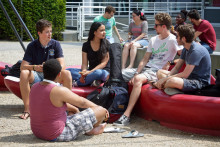It should come as no surprise that less CO2 was emitted in 2020 than in 2019. As of March 2020, the campus was almost completely shut down and many aircrafts were grounded. That is also reflected in the figures. But, as policy officer for Environment & Sustainability Brechje Maréchal points out, corona also caused a downside. ‘The influence of corona on the decrease is not as great as people think. This is reflected in a detailed analysis of the first month of corona.’
Maréchal gives two examples. ‘Think of ventilation. While there were hardly any people present, there suddenly had to be ventilation in buildings 24/7. Heating cold air costs a lot of energy. And we want to become more sustainable as a community. If working from home continues to be a structural factor, the heating and the laptop will be switched on more often at home. In that case, you have to take these figures into account in the long term.’
Transparent
Corona makes it difficult to draw conclusions from the report. The same applies to the target to reduce emissions by 15% in 2023 compared to 2020. ‘It may not be realistic to emit 15% less in 2023 compared to a pandemic year. That is why the process towards 2030, when we want to be fully sustainable, is much more important. You see a lot of interest on the campus in contributing to that goal. To increase that commitment, we want to be as transparent as possible.’
What makes Maréchal satisfied is that, by 2020, 17 more companies shared their emissions with the UT. According to her, that shows that society is changing. Two UT buildings (the ITC Hotel and Drienerburght) are also off gas, and Citadel and Langezijds will soon follow. ‘It will be interesting to follow how we, as a community, will emerge from the crisis. Especially in the area of mobility. We have seen that you don't have to travel for everything. You can't ban flying and we don't want to do that, but we do encourage to take conscious decisions: is it necessary to travel and if so, aim to reduce emissions as much as possible. Think of a night train or our cycling mission.’







